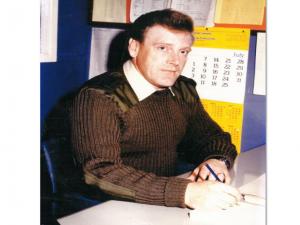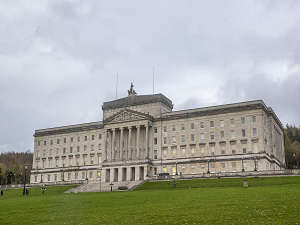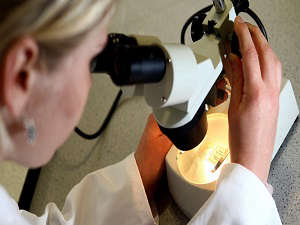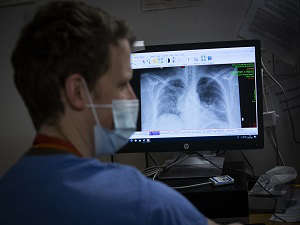
by Rebecca Black, PA
The family of a customs officer murdered by the IRA 40 years ago say the trauma is enduring through generations.
Ivan Toombs, 42, died after he was shot in his office at Warrenpoint docks in Co Down on January 16 1981.
His eldest son Paul – who was 16 at the time and the eldest of five siblings – recalled a difficult time for his family with his mother seriously ill in hospital.
Mr Toombs, a part time Ulster Defence Regiment officer, had survived a previous attempt on his life in 1976, which led Paul to initially hope his father would also survive this attack.
“The drive from Newry High School to Warrenpoint seemed to go on for ages. Some of the girls thought it was our mum as she had a serious operation, we actually didn’t think she was going to make it at one point,” he told the PA news agency.
“It was just a horrendous time. We got by with the help of our grandmother and friends.
“It takes an exceptional person like my mum to hold the whole thing together, especially with five children and teenagers.”
Paul Toombs said his greatest sadness is for all moments his father has missed, such as his graduation and wedding as well as the arrival of grandchildren and great-grandchildren.
“As we have got on with our lives that pain and hurt hasn’t gone away, especially when it comes to a significant anniversary like this,” he said.
“It has brought back up memories and thoughts, to think that my dad was only 42 when he was murdered and now it has been 40 years.”
Paul Toombs named his own eldest son Ivan in memory of his father.
Ivan said that from a young age he had known about his grandfather but it was only when he was a teenager that he learned the detail of what happened.
“It’s an anniversary which is ingrained in your memory,” he said.
“Obviously my grandfather’s murder was long before my time. Dad and I have always been close, so growing up I was always very aware of what happened.
“As a child it is very difficult to try and understand, but as you get older and start to educate yourself, and others around you educate you about what happened in Northern Ireland’s past, you become more familiar with it.
“I was always very conscious of this anniversary, it was an emotional time for my dad – I see the trauma which was re-engaged at a later stage in his life.
“That’s something that I find quite chilling. You think you live in times of peace but sometimes people forget the lasting effect it has on the second generation and even, to an extent, the third generation.
“We have dealt with that pain with dad – when it comes to the anniversary you are always aware to reflect in your own way and be a comfort to my dad.”
Paul Toombs said that while many would “try to demonise the UDR”, most of its members – like his father – were good people who wanted to make Northern Ireland a better place.
He had also been a scout leader and played hockey, rugby and football.
“He felt that for normal, good society for everybody, somebody had to stand in the void and keep the peace, and for the vast majority of people that I speak to within the security forces, that was also their main drive,” he said.
“Nothing pays you for being out to 4am in driving rain, sleet and snow. Money doesn’t pay you for that, an exceptional type of person wants to do that role, and I think dad embodied that.”
Following the first attempt on his life he was offered transfers across the UK, but as a proud Warrenpoint man he wanted to stay.
Despite a long Army career, Mr Toombs had not wanted military trappings at his funeral to ensure anyone could feel comfortable attending.
Then Bishop of Down and Dromore Robin Eames paid tribute to him by quoting his own words as he conducted the service in 1981.
“Surely someday, people will come to see that there are some things which are so good that they will endure,” he said.
No one has ever been convicted of the murder.
The former Historical Enquiries Team reviewed the original police investigation, but Paul Toombs said their report raised more questions than answers.
“We have not been proactive in seeking justice. I’m a Christian, I have given my testimony, and part of that is telling what happened,” he said.
“But it’s an extra burden you carry when no one has been brought before the courts for their crimes.
“In terms of justice, do we sacrifice justice for truth? I don’t think so. Do you really get truth? I don’t think so.
“In terms of forgiveness, I give that over to God. How can you forgive someone who doesn’t actually show remorse, say sorry, repent, or even say what they have done is wrong.”


 Stormont has ‘engaged with police’ over abuse of MLAs
Stormont has ‘engaged with police’ over abuse of MLAs
 Woman knocked unconscious following assault in Banbridge
Woman knocked unconscious following assault in Banbridge
 Queen’s team part of £5.5m research project to transform bowel cancer care
Queen’s team part of £5.5m research project to transform bowel cancer care
 16% of health imaging equipment in NI is ‘effectively obsolete’
16% of health imaging equipment in NI is ‘effectively obsolete’